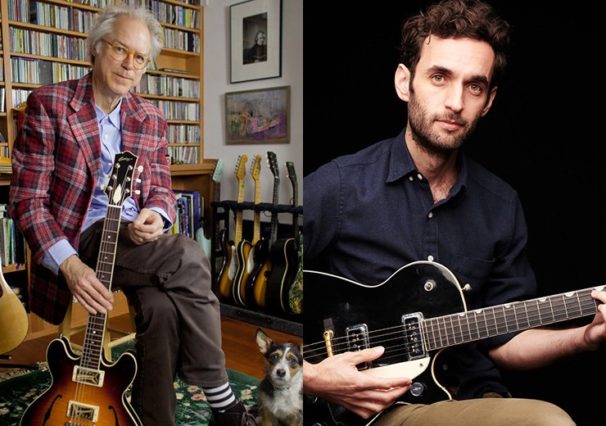
Guitarist Bill Frisell has proven himself as one of the most interesting conceptualizers of the past twenty years or so in jazz. His albums are a continual source of delight and amazement, as he takes his audience down one musical rabbit hole or another. Whether he’s playing his own original scores to Buster Keaton’s silent features, or interpreting composers as disparate as Nino Rota or Aaron Copland or 1980s power trio funk-jazz, Frisell has a way of bringing it all together under the umbrella marked Americana. He has a keen awareness of just what constitutes American music. But rather than standardize disparate material, Frisell’s low-volume explorations expose seldom-considered facets of familiar composers.
Frisell is an engaging collaborator, and that’s one of his main ingredients. It’s standard procedure for record labels to pair a couple of artists with marquee recognition for an album, then tour them until they’re ready to go their separate ways. Frisell’s partner at Royce Hall on Thursday, December 5, is fellow guitar virtuoso Julian Lage. They’re not promoting any albums, so there’s no body of pieces they’re obligated to run through.
“I’d heard about Julian about fifteen years ago,” says Frisell, from his New York home. “Our first meeting was typical for musicians—we met in a Vancouver hotel lobby. We’d cross paths here and there, sit in on the other’s gigs, but we really got together at The Stone in New York City, playing duets. ‘Joy’ is the only word that comes to mind and, I guess I’m selfish, but I want that. And I’m lucky to have it with Julian.”
At the Healdsburg Festival in Northern California last year, Frisell and Lage began their set by meandering through a long, probing introduction that eventually morphed into a 21st Century realignment of the Benny Goodman/Charlie Christian swing workout, “Seven Come Eleven.” Was the tune agreed upon prior to the set, or did it just emerge out of the improvisation? “I don’t remember how we got to that tune,” Frisell says. “I just remember that how we got there felt great. We’re like two friends having a conversation; the guitars almost disappear.”
Frisell and Lage each have a healthy regard for space in the music. They leave holes for the other player, and they both may play out-of-tempo, or floating chords and tones over the piece. Most importantly, they’re both listeners, and they react in real time to what they hear. At Royce you’ll hear two distinct instrumental voices that enlarge each other.
Jim Hall (1930-2013), the Zen master jazz guitarist whose well-chosen chords and notes always enhanced the settings he worked in, is a meeting place for Frisell, 68, and Lage, 31. “I first heard Jim in 1969, before Julian was born,” says Frisell. “I got to study with him, and he showed me how the guitar could open up a whole world of music.”
Mention of the albums that Hall recorded with lyrical trumpeter Art Farmer in the 1960s, draws an animated response from the humble Frisell. “Those records were massive to me,” he affirms. “Jim was radical, almost subversive in how he came from deep inside the music. With him, it was always about the total sound of the group he was playing for, and how to make it better. Again—I’m selfish because I want that for myself, and with Julian I can have it.”
Kirk Silsbee publishes promiscuously on jazz and culture.
Bill Frisell & Julian Lang Duo | CAP UCLA | Royce Hall | Dec 5
